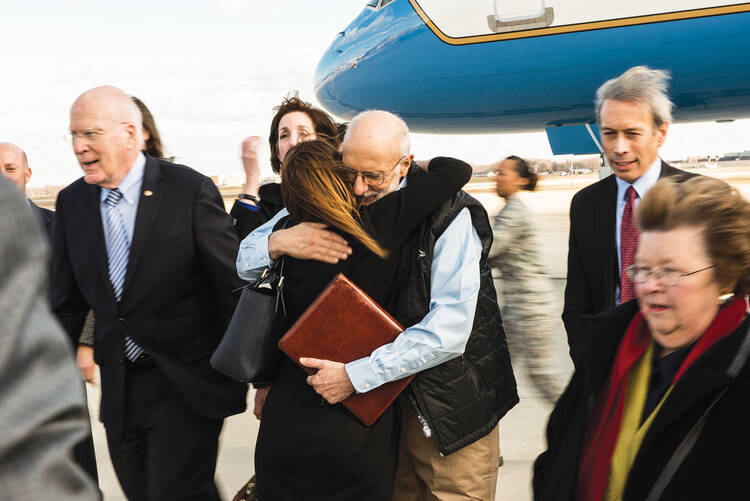Watching a Vatican-brokered diplomatic breakthrough in De-cember that may lead to the normalization of relations between the United States and the island nation of Cuba, Eusebio Mujal-León was hardly a disinterested bystander. A professor at Georgetown University, Mujal-León is the director of a Georgetown research initiative called the Cuba XXI Project. But Mujal-León is also Cuban born; as a child he fled with his family to the United States from Cuba in 1960.
“It is a historic agreement,” he said, “but behind it are deeper problems and issues” that will require much more time and effort to resolve.
The successful conclusion of 18 months of secret negotiations between Cubans and Americans—facilitated by Vatican and Canadian diplomats and spurred on by the dramatic intervention of Pope Francis, who wrote letters to both presidents, Barack Obama and Raúl Castro, encouraging the dialogue—left Mujal-León with “mixed feelings.” The breakthrough was “dramatic, but not as productive as it could have been,” he argues. “I think it’s good news, but I’m a little concerned about whether or not the lives of ordinary Cubans will improve.”
Mujal-León believes President Obama should have pressed harder for a better deal from President Castro, although he notes that the declining health of Alan Gross, an American who was imprisoned for five years in Cuba, may have compelled the conclusion of the negotiation. “The agreement is fundamentally a prisoner swap, with an opening of embassies then a series of executive orders that will make tourism, traveling, investment and the movement of money easier,” Mujal-León said. “All of those things have taken place without any explicit statement by the Cuban government that there will be expanded economic reforms or any kind of political reform.”
“According to Mujal-León, the central hope of the new approach to Cuba is that “increased commerce and trade and tourism will open up Cuba” and that the rising economic tide that should result will improve the living standards of all Cubans. He harbors some concern that hope may be misplaced.
“It underemphasizes the political will and political capacity of the ruling elite in Cuba; I don’t think they are interested in going down that route” toward greater civil expression. Cuba remains “a highly centralized, personalized dictatorship,” even under the relatively more humane oversight of Raúl Castro. Fidel’s younger brother has “muted” some of the most authoritarian impulses of Cuba’s one party, socialist system, and there are now “more spaces for openness, but even under Raúl, Cuba is a place where there are sharply limited political rights.”
Cuba’s political elite “are going to want to try to retain control.” The question that only the future can answer is, will they be successful?
Mujal-León describes himself as unsurprised by the activist role taken by Pope Francis in fostering the dialogue between the United States and Cuba. It is, to him, typical of the greater engagement with world affairs that Francis seems willing to risk.
“He’s a very political pope, and he played a stronger hand than other recent pontiffs might have,” he said. He believes Pope Francis may similarly be willing to take on other vexing challenges in the region, particularly on issues where the Holy See’s intervention can lead to concrete results, like assisting with the final disposition of detainees at Guantánamo Bay.
Other problems where a Vatican role would be welcome, but more problematic for Pope Francis, he suggests, might be in assisting in final talks toward the peaceful resolution of the decades-long civil war in Colombia. Here “deeper levels of distrust and violence” make a papal intervention more hazardous for Pope Francis. One acute problem in Latin America, Mujal-León adds, is also one that would prove the most significant challenge to Pope Francis: addressing Latin America’s spiraling rate of violent crime.








